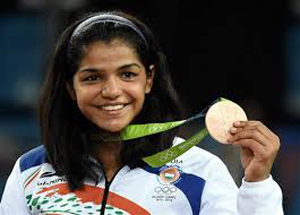Rio De Janeiro, Aug 18: After ending India's agonising wait for an Olympic medal at the Rio Games with a bronze medal, Indian women wrestler Sakshi Malik said it was the result of her 12 years of persistent hard work.
 Sakshi today scripted history by becoming the first woman wrestler from India to bag an Olympic medal and only fourth female athlete from the country to climb to the podium at the biggest sporting event.
Sakshi today scripted history by becoming the first woman wrestler from India to bag an Olympic medal and only fourth female athlete from the country to climb to the podium at the biggest sporting event.
"Meri 12 saal ki tapasya rang layi (It's the result of my 12 years' fight for day and night). Geeta didi, my senior had qualified for the first time in London," Sakshi said, with tears of joy in her eyes.
"I never thought I would become the first woman wrestler from India to bag an Olympic medal in wrestling. I hope the remaining wrestlers will also do well," Sakshi said.
The 23-year-old from Haryana, a silver medallist at the 2014 Glasgow Commonwealth Games and bronze winner at the 2014 Incheon Asian Games, earned a dramatic come-from-behind 8-5 win over Kyrgysztan's Aisuluu Tynybekova in the bronze medal play-off here.
"It's in the women's section, we have got the first medal for India," said an ecstatic WFI president Brij Bhushan even as he hugged her in joy.
Sakshi earned the dramatic win after falling behind 0-5 following the first period in the do-or-die bout. The Indian turned the tables on the Kyrgyzstan wrestler in the dying seconds of the bout as Tynybekova was in complete command in most part of the clash.
On her defensive approach that saw her trailing 0-5, Sakshi said: "I never gave up till last, I knew I would win if I lasted till six minutes. In last round, I had to give my maximum, I had the self belief."
Sakshi had lost 2-9 in the quarter-finals to Russia's Valeriia Koblova in the fifth bout of the day before getting a second chance in repechage when her conqueror reached the final.
"It was an agonising two-three hours wait for me. Congratulations to my country mates, I could live up to their reputation," she said.
Like in three of the four other bouts earlier in the day, Sakshi won the crucial bout after coming from behind. In fact, Sakshi's winning move that got her two points initially was challenged by her Kyrgyztan rival and it was reviewed and she was awarded an extra point by the judges much to her rival's chagrin.
Weightlifter Karnam Malleshwari (2000, Sydney), boxer MC Mary Kom (2012, London) and shuttler Saina Nehwal (2012, London) were the only other women players from India to have won a medal in Olympics.
This was India's fifth medal in wrestling where Sushil Kumar has the distinction of winning a silver in London 2012.
Sakshi, who qualfied through second Olympic Games World Qualifying Tournament in Istanbul, battled social biases and sexism to learn wrestling. She took up the sport when she was just nine years old.





Comments
Add new comment